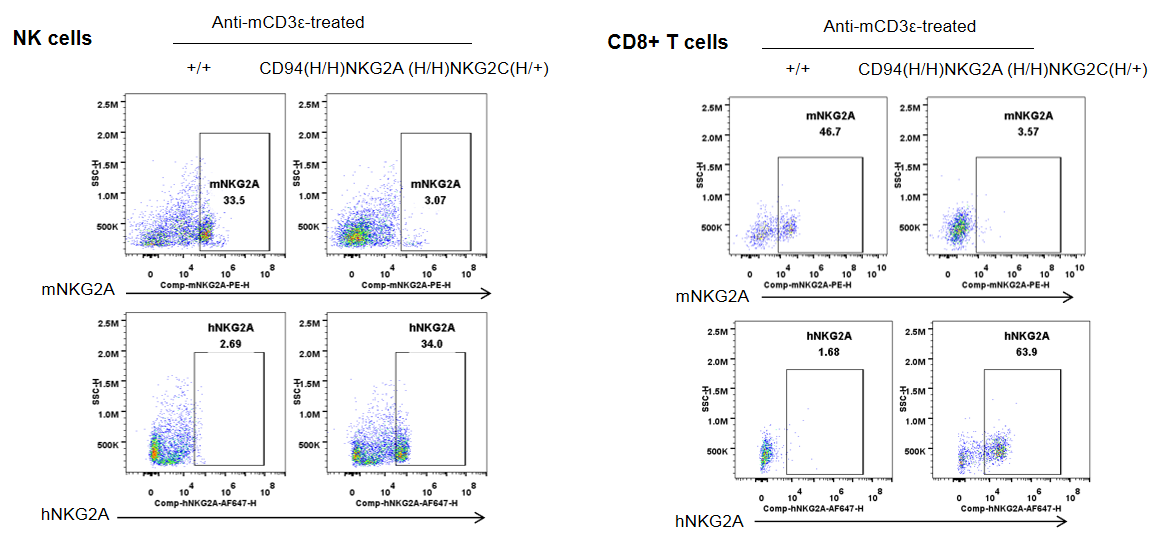中文
B-hCD94/hNKG2A/hNKG2C mice
| Strain Name | C57BL/6-Klrd1tm1(KLRD1)BcgenKlrc1tm1(KLRC1)BcgenKlrc2tm1(KLRC2)Bcgen/Bcgen | Common Name | B-hPVRIG/hTIGIT mice |
| Background | C57BL/6 | Catalog number | 112445 |
| Aliases | KLRD1(CD94); KLRC1(NKG2A,CD159A); KLRC2(NKG2C,CD159C) | ||
模型验证
Protein expression analysis

Strain specific CD94 expression analysis in heterozygous B-hCD94/hNKG2A/hNKG2C mice by flow cytometry. Splenocytes were collected from wild-type mice and heterozygous B-hCD94/hNKG2A/hNKG2C mice and stimulated with anti-CD3ε in vivo (7.5 μg/mice, stimulation for 24 hours, i.p. ), and analyzed by flow cytometry with species-specific anti-CD94 antibody. Human CD94 were exclusively detectable in heterozygous B-hCD94/hNKG2A/hNKG2C but not in wild-type mice.
 ‘
‘
Strain specific NKG2A expression analysis in heterozygous B-hCD94/hNKG2A/hNKG2C mice by flow cytometry. Splenocytes were collected from wild-type mice and heterozygous B-hCD94/hNKG2A/hNKG2C mice and stimulated with anti-CD3ε in vivo (7.5 μg/mice, stimulation for 24 hours, i.p. ), and analyzed by flow cytometry with species-specific anti-NKG2A antibody. Human NKG2A were exclusively detectable in heterozygous B-hCD94/hNKG2A/hNKG2C but not in wild-type mice.

Strain specific NKG2C expression analysis in heterozygous B-hCD94/hNKG2A/hNKG2C mice by flow cytometry. Splenocytes were collected from wild-type mice and heterozygous B-hCD94/hNKG2A/hNKG2C mice and stimulated with anti-CD3ε in vivo (7.5 μg/mice, stimulation for 24 hours, i.p. ), and analyzed by flow cytometry with species-specific anti-NKG2C antibody. Human NKG2C were exclusively detectable in heterozygous B-hCD94/hNKG2A/hNKG2C mice but not in wild-type mice.
Copyright © 2024 百奥赛图江苏基因生物技术有限公司. All Rights Reserved
备案号: 苏ICP备2021053911号-1
 苏公网安备:32068402320845号
网站建设:北京分形科技
苏公网安备:32068402320845号
网站建设:北京分形科技
 苏公网安备:32068402320845号
网站建设:北京分形科技
苏公网安备:32068402320845号
网站建设:北京分形科技






 010-56967680
010-56967680 info@bbctg.com.cn
info@bbctg.com.cn